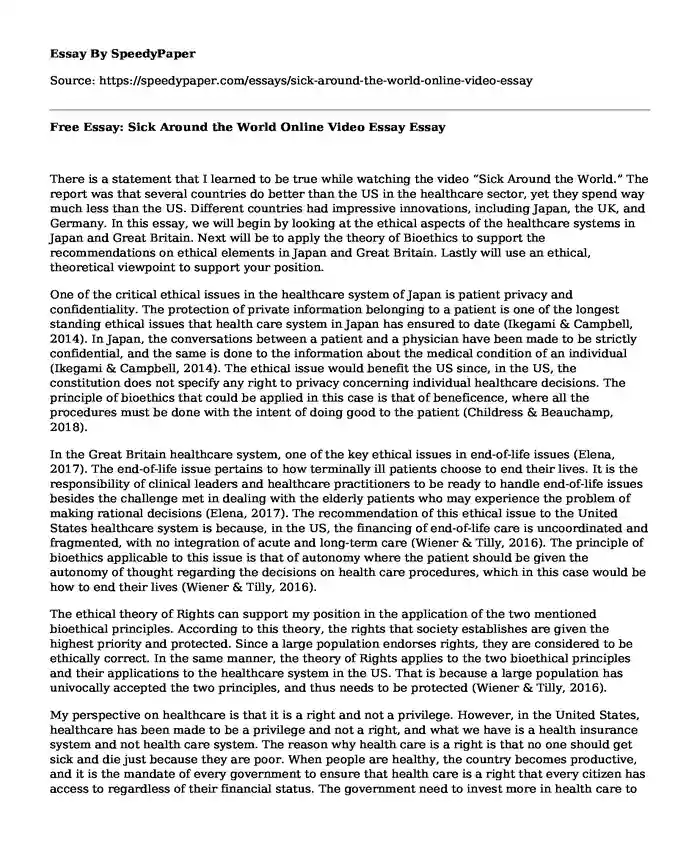
| Essay type: | Compare and contrast |
| Categories: | World Healthcare policy Community health Comparative literature |
| Pages: | 3 |
| Wordcount: | 738 words |
There is a statement that I learned to be true while watching the video “Sick Around the World.” The report was that several countries do better than the US in the healthcare sector, yet they spend way much less than the US. Different countries had impressive innovations, including Japan, the UK, and Germany. In this essay, we will begin by looking at the ethical aspects of the healthcare systems in Japan and Great Britain. Next will be to apply the theory of Bioethics to support the recommendations on ethical elements in Japan and Great Britain. Lastly will use an ethical, theoretical viewpoint to support your position.
One of the critical ethical issues in the healthcare system of Japan is patient privacy and confidentiality. The protection of private information belonging to a patient is one of the longest standing ethical issues that health care system in Japan has ensured to date (Ikegami & Campbell, 2014). In Japan, the conversations between a patient and a physician have been made to be strictly confidential, and the same is done to the information about the medical condition of an individual (Ikegami & Campbell, 2014). The ethical issue would benefit the US since, in the US, the constitution does not specify any right to privacy concerning individual healthcare decisions. The principle of bioethics that could be applied in this case is that of beneficence, where all the procedures must be done with the intent of doing good to the patient (Childress & Beauchamp, 2018).
In the Great Britain healthcare system, one of the key ethical issues in end-of-life issues (Elena, 2017). The end-of-life issue pertains to how terminally ill patients choose to end their lives. It is the responsibility of clinical leaders and healthcare practitioners to be ready to handle end-of-life issues besides the challenge met in dealing with the elderly patients who may experience the problem of making rational decisions (Elena, 2017). The recommendation of this ethical issue to the United States healthcare system is because, in the US, the financing of end-of-life care is uncoordinated and fragmented, with no integration of acute and long-term care (Wiener & Tilly, 2016). The principle of bioethics applicable to this issue is that of autonomy where the patient should be given the autonomy of thought regarding the decisions on health care procedures, which in this case would be how to end their lives (Wiener & Tilly, 2016).
The ethical theory of Rights can support my position in the application of the two mentioned bioethical principles. According to this theory, the rights that society establishes are given the highest priority and protected. Since a large population endorses rights, they are considered to be ethically correct. In the same manner, the theory of Rights applies to the two bioethical principles and their applications to the healthcare system in the US. That is because a large population has univocally accepted the two principles, and thus needs to be protected (Wiener & Tilly, 2016).
My perspective on healthcare is that it is a right and not a privilege. However, in the United States, healthcare has been made to be a privilege and not a right, and what we have is a health insurance system and not health care system. The reason why health care is a right is that no one should get sick and die just because they are poor. When people are healthy, the country becomes productive, and it is the mandate of every government to ensure that health care is a right that every citizen has access to regardless of their financial status. The government need to invest more in health care to ensure that all the citizens are at every point able to get access to free treatment without getting subdued to pay for such services.
References
Childress, J. F., & Beauchamp, T. L. (2018). Principles of biomedical ethics (p. 618). New York: Oxford University Press. http://www.allisonkrilethornton.com/wp-content/uploads/Medical_Ethics_Readings/BandC-Moral-Dilemmas.pdf
Elena, S. (2017). Crimean war and establishing of public health system in Great Britain. Naucnyi almanax stran Pricernomoria, (1 (9). https://cyberleninka.ru/article/n/crimean-war-and-establishing-of-public-health-system-in-great-britain
Ikegami, N., & Campbell, J. C. (2014). Japan’s health care system: containing costs and attempting reform. Health affairs, 23(3), 26-36. https://www.healthaffairs.org/doi/abs/10.1377/hlthaff.23.3.26
Wiener, J. M., & Tilly, J. (2016). End-of-life care in the United States: policy issues and model programs of integrated care. International journal of integrated care, 3. https://www.ncbi.nlm.nih.gov/pmc/articles/PMC1483949/
Cite this page
Free Essay: Sick Around the World Online Video Essay. (2023, Sep 07). Retrieved from https://speedypaper.net/essays/sick-around-the-world-online-video-essay
Request Removal
If you are the original author of this essay and no longer wish to have it published on the SpeedyPaper website, please click below to request its removal:
- The Picture of Dorian Gray - Essay Examples
- Indentured Servitude and Colonial Labor - AP US History Essay Sample
- Free Essay on The Legend of Sleepy Hollow - Compare Ichabod Crane and Brom Bones as American types
- Essay Example Discussing the Issues in Tech Integration (Privacy)
- Research Proposal Paper Sample: Implementation Plan for Evidence-Based Practice
- Essay Example: Patient's Safety and Factors Influencing Their Safety
- Essay on Effective Communication in Clinical Practices: A Comparison of Two Cases
Popular categories




